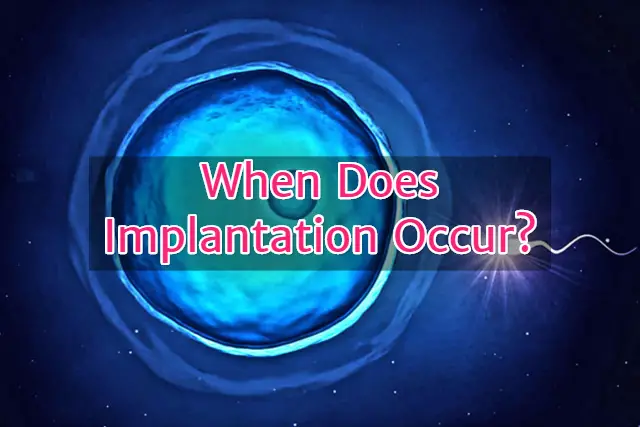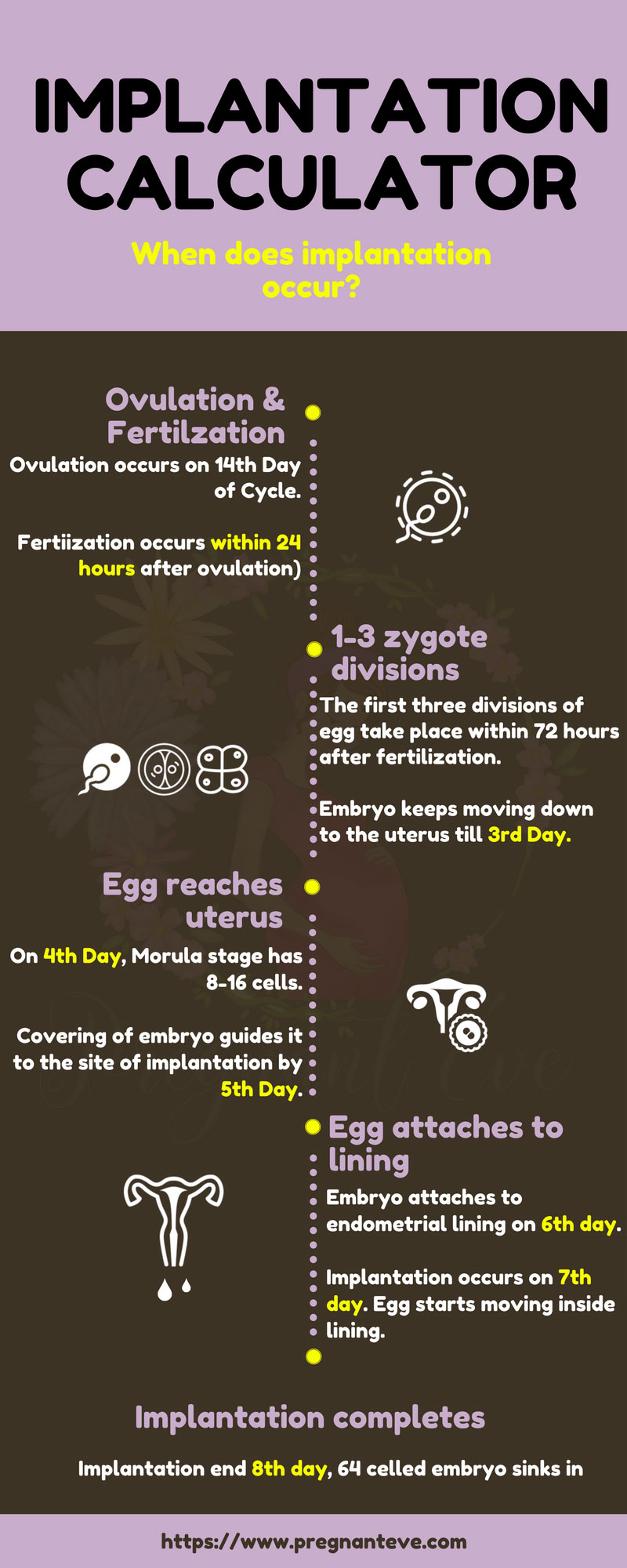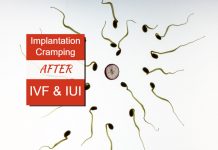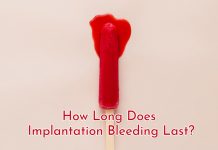When does implantation occur? Implantation occurs a week before the day of the missed period. Attachment of embryo cells to the wall of the uterus is implantation. The site of fertilization are the fallopian tubes and development takes place in the uterus. After ovulation, it takes 7-9 days for the fertilized egg to travel down the fallopian tube.
So, you’re trying to conceive. Apart from getting busy under the sheets, you must also be trying to spot the days your most fertile days and ovulation. Questions like ‘When does implantation occur?’ might too be bothering you.
The most fertile days of a woman occur mid-cycle during ovulation. This is when conception has high chances of happening.
After fertilization the next major phase is Implantation. It is essential for a woman to know the duration and importance of the period. The elaborate signs associated with implantation are equally crucial.
If you know your cycle well, then chances of getting pregnant in the nearest cycle increase.
When Does Ovulation Occur?
Ovulation is the process in which a mature egg is released from the ovary into the Fallopian tube from where it starts to go towards the uterus. Ovulation occurs mid-way through a woman’s menstrual cycle.
To determine when does ovulation occur, you should subtract 12 to 10 days from your menstrual cycle length. Most probably, your ovulation will start around these dates.
So for a woman with a normal 28-day cycle, ovulation can occur anytime between 12 to 17 days.
It will vary with each woman as the duration of a menstrual cycle varies with each.
When Does Fertilization Occur?
Once the ovulation starts, the egg (ovum) is released into the Fallopian tube. The ovum is up for fertilization with sperm for 12-24 hours only. If the sperm manages to reach the Fallopian tube and penetrate the egg during this period, the egg fertilizes.
Once a single sperm has penetrated, egg changes itself immediately to block other sperm from entering. This fertilized egg is now called zygote.
Couples should try to time their efforts to conceive during this window to increase their chances.

When does implantation occur?
After fertilization, the next big stage is the implantation. It is the start of a fascinating journey called motherhood.
The fertilized ovum embeds itself into the wall of the uterus. This process is known as implantation.
Your pregnancy isn’t actually real until implantation occurs. The soft pillows supplied with blood vessels welcome the egg. But the egg pricks them and causes them to bleed. The wall of the egg has pointy structures that pierce the upper layers of the uterine wall.
Initial symptoms of implantation such as cramping and implantation spotting are because of this prick.
First, the sperms travel up to the fallopian tubes and fertile egg. Later the two (Sperm & Egg), after fertilization, become a zygote and return down to the uterus.
When does implantation happen after having sex?
But when does implantation happen? How long does implantation take?
To understand the process of implantation you need to rewind a few days back.
Your fertility window is a period of 7 – 5 days. It starts 3 days before ovulation and continues until a day or 24 hours after it.
Days Before Ovulation Changes
Sperms can live inside the vagina for around 5 days. Practically speaking the lifespan of sperm is only 3 days. Thus, if you have sex 3 days before ovulation, it can lead to pregnancy.
Ovulation day is the time when the egg makes a grand entry and sperms are waiting for it. Once the egg fuses with any of the sperm, it blocks entry of more sperms.
Later, 3 days after ovulation when fertilization occurs, the zygote divides enough to become a bunch of cells. This structure, called ‘blastocyst’ is on its way to the uterus.
Ahead to 7 days after ovulation the blastocyst divides more and more. The cells increase in number and attach to the wall of the uterus. Some women can take longer, and implantation occurs after 12 days in them.
Normally, implantation occurs after 7-9 days after ovulation. Implantation bleeding also occurs at this time, and it is a real sign.
After implantation, the second phase of pregnancy begins. The egg prepares to shift from yolk sac to placental nutrition.
Three germ layers begin forming and initiation of development occurs.
Early pregnancy symptoms before missed period are implantation bleeding signs. About 2 weeks after ovulation the pregnancy test can detect pregnancy.
Levels of hCG are enough for most sensitive pregnancy test 9 days after ovulation.
How long after ovulation does implantation occur?
Implantation of a fertilized ovum can occur within 6-12 days. Usually, implantation happens on the 9th day after ovulation.

How long does implantation take?
The Zygote’s journey from the Fallopian tube to the uterus takes 6-7 days.
During the first three days, it develops in the Fallopian tube and then enters the uterus. By the 5th day, it gets transformed from a Zygote to a Morula to a Blastocyst.
For the next 2-3 days, blastocyst readies itself for implantation. As soon as implantation occurs, a hormone called Human Chorionic Gonadotropin starts producing. It is most commonly known as hCG.
When one takes a pregnancy test, hCG hormone is detected in the urine.
How does the uterus prepare itself for implantation?
The uterus undergoes a series of processes to prepare itself for the blastocyst (a bunch of your baby’s first cells).
The blastocyst has to attach to the wall of the womb and remain attached there until birth.
Endometrium (womb lining) is not always viable for attachment with the embryo. Due to internal changes, it becomes suitable for adhesion but just for a fixed period known as its window period.
The window period lasts from 6 days to 12 days after ovulation. The internal changes taking place in the uterus are:
- The endometrium begins to thicken and expand due to rise in the level of estrogen before ovulation.
- After the release of progesterone, a process named Decidualization takes place.
- In Decidualization, white blood cells gather around arterioles and capillary (blood veins).
- Endometrium starts to swell because of the accumulation of interstitial fluid.
- hCG hormone increases the blood supply to the uterus.
- All these factors together provide a hospitable environment for the blastocyst.
- But there are still chances of implantation not occurring. If such is the case, the endometrium breaks down and sheds along with the blastocyst (spontaneous miscarriage). Some women might mistake it for menses.
Implantation Symptoms: What are the signs of implantation?
Some embryos fail to implant, and the others implant beautifully. These signs help us to conclude whether implantation has occurred or has not.
Women who are trying hard to have babies are very vigilant of signs of implantation. But these signs are not known to all.
In fact, sometimes some signs exhibited in the first pregnancy do not show in the next pregnancy. So these signs vary a lot and are intriguing which is why we have made a list of the common symptoms.
1) Implantation Bleeding
- Implantation bleeding (or implantation spotting) is one of the most typical signs of implantation. Bleeding occurs because of embedment of the blastocyst into the uterus.
- It is due to the breaking of blood vessels during the process of implantation.
- It is not heavy like menstrual periods it is rather light and pink to brownish discharge.
2) Implantation Cramping
- Implantation cramping feels a lot like menstrual cramping and thus confuse many women. They believe that it is the start of periods.
- This cramping is mild to moderate in nature. It affects the lower abdomen and back and lasts for a few days.
- It is normal, and it occurs due to contraction of the muscles of the uterus during contraction.
3) Swelling and tender breasts
- If your breasts have swelled up to the size of melons and it feels tender when touched, you can thank the sudden rise in your hormones for that.
- If your breasts feel swollen or tingly seven days after ovulation, then chances of implantation to have occurred are high.
4) Basal Body Temperature
- Most doctors suggest women keep a chart of their basal body temperature.
- Hormone progesterone causes a rise in basal body temperature. It remains high during ovulation and implantation.
5) Frequent urge to urinate
- If you find yourself going to the loo frequently, it indicates implantation. A pregnancy hormone called Human Chorionic Gonadotropin (HCG) increases the blood supply to the pelvic region.
- As a result of which the bladder becomes irritable making you visit the loo frequently.
6) Food cravings
- During and after implantation, a female’s body becomes an orchestra of hormones.
- So the female develops an aversion to a particular food and develops sudden cravings for certain foods.




![Implantation Bleeding With Twins [How long does IB last with twins?] Implantation Bleeding With Twins](https://www.pregnanteve.com/wp-content/uploads/2019/01/implantation-bleeding-with-twins-218x150.jpg)





i need help im bleeding no cramps and no blood clots my boyfriend said its excess blooding for implanted bleeding can u tell me pls i had sex last weekend let me know ty
Implantation bleeding isn’t heavy. Depending on the date of expected period, you get it a week before.